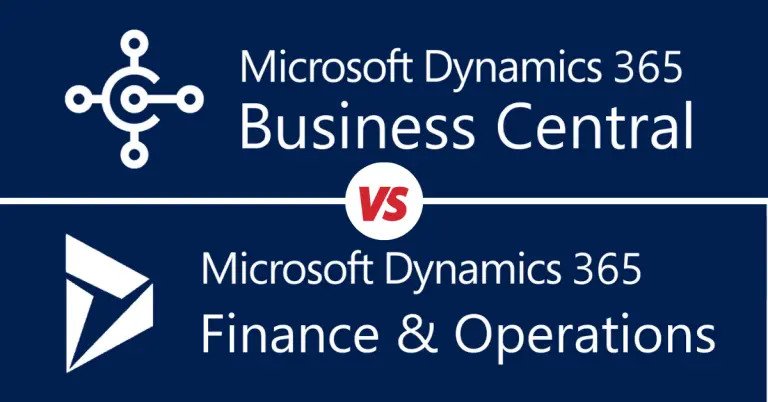D365 Finance and Operations Vs Business Central

A very common question that most companies tend to have about the evaluation of ERP solutions is what is the difference between Dynamics Business Central and Microsoft Dynamics 365 finance and Operations. Both of these important applications have some things that are common.
A very popular and common feature that is present in both the ERP systems is the cloud and on-premises deployment option. Not to mention that there is a pretty huge library consisting of different add-on apps in both software solutions. There are seamless integrations, subscription licensing options, and other insights that these two solutions have in common for sure.
However, there are some important differentiators that both Business Central as well as Microsoft Dynamics 365 Finance tend to have. Here, some details about such differences are provided. This will help businesses decide which system is better suited for their needs and requirements in the best way.
What is Dynamics Business Central?
Known formerly by another name which was Dynamics NAV, Business Central is the latest inclusion into the list of the important ERP software options that businesses these days can use for sure. The application is used by more than 160000 businesses all across the world for sure.
Business Central has suited mostly for Small as well as Medium-sized Businesses that want to achieve growth and success in the future. The attractive pricing plans and important integrations are some of the key benefits that users are provided if they are using Microsoft Dynamics Business Central in the first place.
What are Dynamics 365 Operations?
What we know today as Microsoft Dynamics 365 FO or Dynamics 365 Operations, was formerly called Dynamics AX. The recent name for the software is also Finance and Supply Chain Management. It is a pretty robust and new ERP system that is a part of the model structure of Microsoft Dynamics. This system is most suitable for large enterprises that have more employees to manage.
There are some important benefits that large organizations can get from Dynamics 365 Finance and Operations in the best way. Some of the important features tend to include project management options, budgeting benefits, financials, accounting, and other effective options. Most of the companies can also benefit from the features of engineering, manufacturing, distribution, and warehousing as well.
Important Differences Between Dynamics Business Central And 365 Finance and Operations
There are some important differences that both Business Central and Dynamics 365 Finance and operations tend to have. Some are mentioned below in detail.
-
Core Functionality
Both of the systems are considered ERP-based platforms, but there is a difference in the core functionality of the systems for sure. Business Central, for example, has simpler functionalities that are closely related to different operations such as accounting, financials, operations models. However, Finance and Operations from Microsoft Dynamics tends to have other details in the core functionality for sure. There are some elaborate details in Dynamics FO that are different from Dynamics BC for sure.
-
Configurability
One of the best things about Business Central is that it is a particular system that is pretty easy to use and requires no additional training for sure. Apart from that, it has a pretty smooth interface. So, it will be suitable for small customizations. However, Finance and Operations is a pretty big and complex ERP system that has proper flexibility to configure according to the suitability of the businesses these days.
-
Business Operation Scale
The most notable difference between these two software options would probably have to be the scales of business operation that they both have. While Business Central tends to be a pretty simple solution that has less revenue, Finance and Operations tends to be a solution opted for larger-scale businesses and require more revenue.
Conclusion: Which Is Better?
When it comes to deciding between the two options. It actually depends on the business size and scale to decide which is more suitable. Dynamics Square can help in the process of implementation of the software, no matter what you choose.



